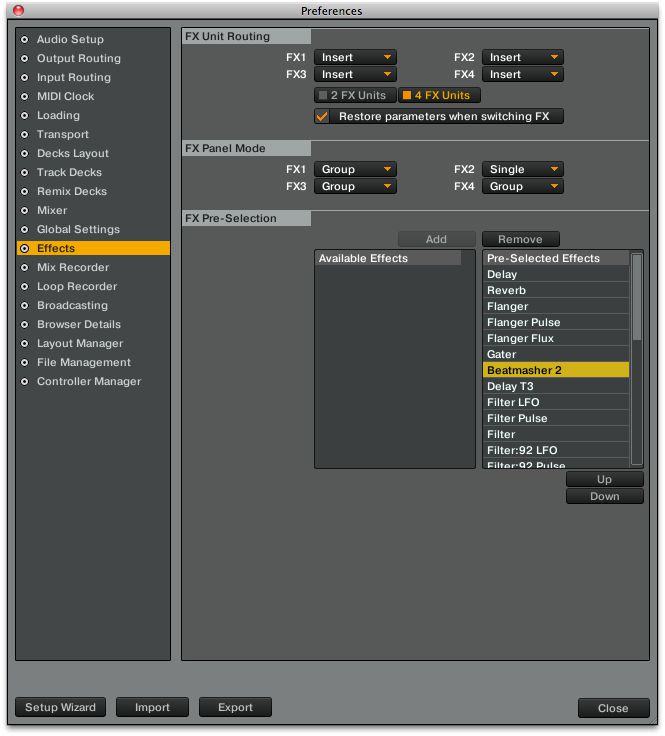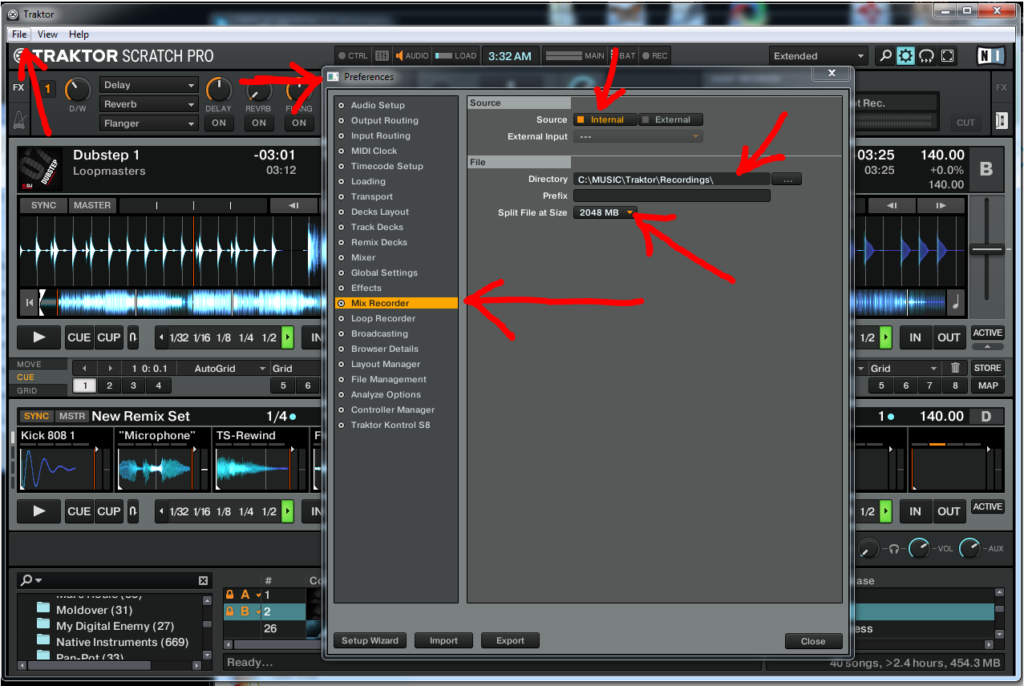- How To Record In Traktor Pro 3
- How To Record Sample In Traktor Pro 2 Crack
- How To Record Sample In Traktor Pro 2 1
- How To Record Sample In Traktor Pro 2 11 1 Update
You may have seen the videos of Dub FX creating a live mash-up set on some rooftop somewhere (if you havent it’s at the bottom of this article), it’s pretty cool to see and even more fun to do. In response to recent question from a Traktor Tips reader I have decided to create a tutorial to show you how simple it really is to record samples in Traktor using the microphone and S4. And how to build a fun track using samples of your voice and other tracks.

Now I am no talented beat-boxer and definitely don’t have a singing voice, this tutorial is just a bit of fun so you can see how it works, so please no making fun of my vocal skills!
What do I need for this tutorial?
- An S4 controller (you can still learn a lot from the video if you don’t)
- A microphone with a 3.5 mill Jack (I’m using my headphones)
- Obviously a copy of traktor installed on your computer.
- Make sure the master snap and quantise is set to on (experimenting with the quantise off, may produce some other desired result)
When you plug-in the microphone, to the back of the S4, make sure the gain level is up, which means turning it to the right as you look at the knob from the back. By default the S4 routes this microphone through deck D. Before you will notice the microphone working, you need to make sure that you turn deck D to a live input using the drop down to the top right corner of the deck.
Additionally, it works when there is a need for distortion in the rising and lowering pitch of songs.Auto-Tune can use as a plugin hosted on DAW during the studio recording, or it can work as a standalone device during live performances. Versions of Antares Auto-TuneAfter its launch in 1997 till now, Auto-Tune kept updating its features. Autotune vst free download windows.
DOWNLOAD FREE REMIX SETS Download these exclusive, free Remix Sets for use with TRAKTOR PRO 2's Remix Decks. Remix genuine material from renowned artists, or enhance your sets with your own selection of musical genres. Samples from the deep, clean, pounding intensity of PULSWERK’s contemporary minimal techno and house sound. Aug 26, 2012 Traktor users: This same technique can very easily be applied to Traktor Pro 2 (which is also super fun because then you can scratch the samples with control vinyl!). Simply drag the recorded music files straight into to your Remix Deck or regular deck in Traktor. The Monitor / Headphone Signal is Missing in TRAKTOR; Setting Up a Pioneer Device for Advanced HID Control with TRAKTOR PRO 2 / 3 VIDEO I Cannot Find the ASIO Driver for My TRAKTOR KONTROL S2 MK3 / S4 MK3 (Windows) How to Record a Mix in TRAKTOR (SCRATCH) PRO Using an External Mixer and the AUDIO 8 DJ. Nov 20, 2011 BradCee Driven Loopy by BradCee Here is a six minute mix of Katy B – Lights On and Sidney Samson – Riverside, performed in Traktor Pro 2 with nothing but loops in the sample decks. 14 Loops juggled in all, three from Katy B and five from Sidney Samson, seasoned with six from a couple of sample packs (the extra drums, basslines.
Record a live mix using S8 through Traktor Scratch Pro 2. Set to internal recording and Traktor will record all sounds from S8's master signal.
You’ll know it is working as you’ll see the blue LED light up in the channel fader.
The Loop Recorder
The loop recorder allows you to record your either the main output, the cue, an external input, or an auxiliary input. For this exercise we will set the Loop recorder to record from the cue channel, so any channel you wish to sample will need the cue button highlighted as ‘on’, for it to work.
The loop recorder has its own latency setting. You will have to play around with this to get the settings just right so that everything works smoothly and in time with one another. To do this I recommend you use two clean tracks, with a distinct kick drum. You will have to sample one track for four beats or more and play alongside another track to test the latency set up. If the track you sample appears to start slightly behind the track you’re playing, then you need to lower the latency level. This might take you a little bit of time to figure out. It may be different for all computers, but I found a sweet spot for me to be around 9 ms.
Either you can get the channels or you can’t. We changed our package and found out ID Discovery and the WE Network are no longer available, period no matter what package you get. According to the phone representative we first spoke to, we received these channels a lot longer than many others because we were “grandfathered” which I don’t understand. We were, also, told the contract ran out a while ago. Auto tune hd xfinity. Why do they keep showing up on our channel lineup?
How to sample a track and test the latency
How To Record In Traktor Pro 3
The loop recorder will record sound coming from a number of different sources. You first have to make sure you select the source you want to record from. As mentioned, we will record from the cue. Setting the loop recorder to cue, will record anything that is sent to the cue channel. In other words anything with the cue button activated (this is usually used to listen to a track in the headphones, whilst mixing it in).
- If you haven’t already, set the master clock as the master temper
- Load a track into deck A, sync it with the master clock and press play.
- Find another track with a clean drumbeat and load into deck B.
- Make sure deck B is also synced and has its cue light on.
- Press play on deck B, it doesn’t matter whether the volume is up or not, however, putting it up a little bit will help you hear which part of the track sounds good to sample (if playing out live, you may want to test this in headphones instead)
- Make sure the ‘dry/wet’ knob on the loop recorder is set all the way to dry. This will make sure that once the loop has finished recording it won’t play out loud in the mix.
- Set the sample length to the required length of beats and when you have found a suitable section of the track to sample go ahead and press record.
Once you’ve created your sample it will automatically play in the loop recorder, however if you have the loop recorder set all the way to dry, as mentioned, you will not hear it. At this point you can turn the dry wet knob to the right to see how it sounds, or check it out in headphones. Once you have the sample you want, you’re going to want to load it into a remix deck cell. (Note:The shift key on the S4 may cause issues with that beat-grid if you have not locked the grid.)
Recording a new sample into the loop recorder
Once there is already a sample in the loop recorder, you will need to get rid of that sample before you can record another. In order to do this you must:

- First, stop the loop recorder from playing. (You can do this by pressing the play button in the loop recorder.)
- You will then see the blue bar in the loop recorder stopped moving
- Now press delete delete recorder to clear the loop recorder
- You are now free to change the loop length and begin another pass of the loop recorder
If you do not clear the loop recorder, the next recording will record ‘into’ the previous recording. This is known as overdubbing and the loop will just gain more and more audio, layering each recording onto the previous one. This is a great way to layer more sounds before moving the sample to the remix deck, as the remix decks only have four slots that you can use.
Loading sample into remix deck
In the header of the remix deck you will see a section that enables you to change the load location, from deck A, to deck B, or to the loop recorder. You need to change this to the loop recorder in order to capture a sample from a location. Once this is set correctly simply pressing one of the sample buttons on deck C of the S4, will load the sample into that related cell. You should now do the following:-
- make sure the sync button is active in deck C. (If the tracks do not appear synced, you must go into the system preferences and change the loop recorder latency).
- Check that the tracks sync perfectly with deck A (This is where a good ear comes in useful)
- If the sample appears slightly behind the track in Deck A, then you will need to lower the latency in the preferences.
- If the sample appears slightly ahead of the track in Deck A, then you will need to increase the latency in the preferences.
Once you have set the latency to the desired position, you are ready to create more samples.
Recording from the Mic
How To Record Sample In Traktor Pro 2 Crack
The mic plugs into the mic socket on the back of S4, you can set the gain to your desired level, usually up high. As the mic uses channel D, you must set channel D’s cue to on. It is now a simple case of inventing something creative to record into the mic. Once you know what you’re going to say:
- set the sample length to either four, eight, 16 or 32, and press record.
- Perform your sample in time with the music.
- once you have your desire sample, you can load it into the second cell along in the remix deck, by pressing the second sample button.
Get creative
Once you’ve got the technical stuff nailed, it’s time to get creative. The video tutorial will show you how to do all of this, except for how to be creative! I apologise for my singing voice, however, it will only encourage you; knowing that you are better than me.
How To Record Sample In Traktor Pro 2 1
This process is a lot of fun and I encourage you to practice so that you can perform this type of routine out live.
How To Record Sample In Traktor Pro 2 11 1 Update
Have you been using this technique already? Have you found this article and video helpful? All your feedback is encouraged, thank you